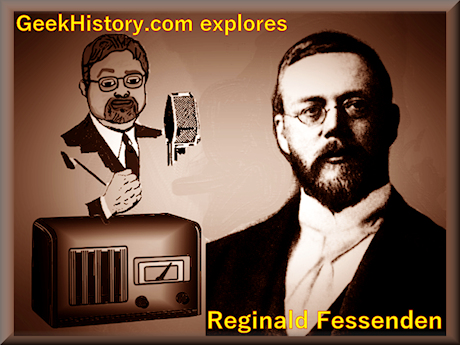 When asked who invented radio, many names will get tossed out. Starting my career in communications, a name most often mentioned as the inventor of radio was Marconi. Searching on the internet a name often mentioned in the invention of radio is Nikola Tesla. Many of the wild claims gave me the drive to dig deeper and to seek the truth. After doing quite a bit of research It was obvious that without a doubt, Reginald Fessenden did more to develop radio that either Marconi or Tesla.
When asked who invented radio, many names will get tossed out. Starting my career in communications, a name most often mentioned as the inventor of radio was Marconi. Searching on the internet a name often mentioned in the invention of radio is Nikola Tesla. Many of the wild claims gave me the drive to dig deeper and to seek the truth. After doing quite a bit of research It was obvious that without a doubt, Reginald Fessenden did more to develop radio that either Marconi or Tesla.
Ironically, the early career of Fessenden sounded similar to Tesla. Reginald Fessenden started his career with Thomas Edison, but later teamed up with George Westinghouse to defeat Edison in the famous "War of Currents.
Born on October 6, 1866 in East Bolton, Quebec, Canada, Reginald Fessenden was an accomplished student of mathematics While he was only a teenager, Fessenden was teaching mathematics to the young children at his school.
After working for two years as the principal, and sole teacher, at the Whitney Institute in Bermuda, Fessenden moved to New York City with the dream of working for Thomas Edison.
Fessenden works for Edison
Initially Fessenden asked Edison for a job as a junior technician, but Edison was looking for a chemist. Edison asked Fessenden "Do you know anything about chemistry?" Fessenden honestly answered "But I am not a chemist..." , Edison told Fessenden to learn the job because he needed a good chemist. Fessenden worked as a chemist developing insulation for electrical wires at Thomas Edison's laboratory, East Orange, New Jersey, from 1887-1890. Fessenden eventually held the title of head chemist for Edison.
In 1890, Edison encountered financial difficulties, and Fessenden was laid off. Although some sources state that Fessenden was lured away from Edison, most state that Fessenden was laid off from Edison's lab. The biography of Fessenden by his widow confirms that in 1890, "owing to financial difficulties and the reorganization of the Edison Companies, substantially the whole laboratory was shut down."
Crossing paths with George Westinghouse